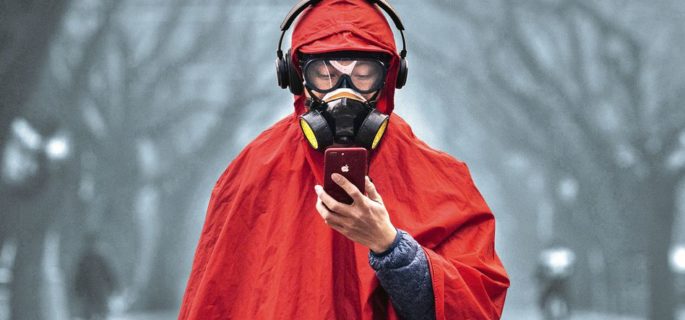The other danger of the Coronavirus
Sat 11:25 am +01:00, 2 May 2020
The Coronavirus shows how Globalization can be a deadly threat. (SPIEGEL-Titelbild 6/2020)
Governments respond to the spread of the disease with an iron fist and threatening initiatives.
Everything has happened quickly, just 10 days that have transformed the world as we know it.
Governments obsessed with debt reduction announce multimillion-dollar aid to prevent the closure of companies and the abandonment of workers.
At the same time, they approve limitations on freedoms witout the consent of the citizens.
In Costa Rica, congresswoman Carmen Chan, has asked that consideration be given to imposing a curfew by force against the population.
This abusive figure does not exist in the Costa Rican legal system, and imposing it would be a direct violation of individual and constitutional guarantees, but this has not prevented many legislators, knowing that such an idea would be illegal, to promote the measure and its possible adoption.
Neither in Costa Rica nor in the rest of the world nobody knows how the coronavirus crisis will end, but an immediate consequence has been the return of the State, with all its weight, its strength and its ability to prevail, at the centre not only of the geopolitical game board, but also the most intimate of our lives.
Borders became obsolete during decades of globalization and supranational integration, but in the face of the epidemic that is spreading across the planet, land boundaries suddenly make sense.
The old state organization — public action, administration, technocracy — acts as the shield against a microscopic organism that infects without distinguishing nationalities.
“We are restoring an outdated order because we do not have other solutions,” says Bertrand Badie, professor emeritus of the Institute of Political Science in Paris and author of L’hégémonie contestée. “The most disturbing thing about this crisis, is that there is no global lever to respond to it.
Those with the levers at hand were the States. The lever of borders, for example. Barriers to free movement began to be erected since January, after China announced the detection of the new pathogen SARS-CoV-2, which causes Covid-19 disease, in the city of Wuhan.
But it has accelerated in this fatal March, when the coronavirus has hit Europe with all its force to make it the epicentre of the pandemic. The chronology is dizzying. On the 11th, US President Donald Trump decreed a ban on flights from the European Union (EU).
On the 17th, the EU bolted the citizens of third countries. Meanwhile, borders reappeared in the Schengen area, where controls should not exist. The European Commission has intervened to remove restrictions on the export of medical supplies between partners.
There is a withdrawal movement: the nationalist reflection that always emerges in the face of threats. The end of an era is in the air, as in 1914 when the “world of yesterday” collapsed.
It was the world in which people went where they wanted and stayed as long as they wanted; in which there were no permits or visas. Now, those borders, with their customs agents, their police and their gendarmerie have become steel barriers.
The echoes of the first deglobalization resonate today. The nationalist revival and the imposition of barriers come from before the epidemic. Trump was his most visible and powerful herald.
Strobe Talbott, Deputy Secretary of State with the Clinton Administration and past president of the Brookings Institution think tank, believes that nationalist instincts and disregard for international cooperation are the wrong answer. “If the human race can weather this plague, it must move from deglobalization to intelligent globalization,” he says.
But, if walls are erected now – between countries, within these countries, in houses – it is because the health emergency imposes it. French President Emmanuel Macron promoted “a Europe that protects” as “the State that protects” arises.
Europeans have committed, according to Brussels estimates, some 160 billion euros of budget spending and 1.6 trillion in guarantees to keep the economy alive.
Taboo words like “nationalization” are becoming popular again. The exception is also legal. In Spain, the state of alarm; in France one of sanitary urgency.
It is as if the State — overwhelmed from above by supranational institutions, multinationals and financial powers; and below by the local powers — fill a void.
Political scientist Josep Colomer, author of The World Government of Experts, qualifies it. He considers that in the face of the coronavirus, both global coordination and local entities and non-governmental organizations have been called into action.
“A global pandemic is one of the clearest manifestations of globalization, that is, of the global interdependence of human relations.”
At the global level, the World Health Organization functions as a department of world government and guides and assists the governments of countries.
But globalization also means complexity and fragmentation. In other words, the opposite of the maximum simplification implied by the idea of sovereignty, which is based on a single centre of absolute and final decision.
There is always something positive in a crisis, and in this is that everyone is aware of having the same interest. Everyone, is in the same situation and is bound to react collectively.
Ronald Reagan said it in other words in 1987, with the Iron Curtain still standing. “With our obsession with the antagonisms of the moment, we forget everything that unites the members of humanity.”
“Perhaps we need an external, universal threat to recognize our common bond,” he declared. “Sometimes I think about how quickly the differences in the world would disappear if we faced an alien threat.”
He was talking about aliens, but he could have been referring to the Coronavirus.
Luis R. Miranda is an award-winning journalist and the founder & editor of The Real Agenda News. His career spans over 23 years in every form of news media. He writes about environmentalism, education, technology, science, health, immigration and other current affairs. Luis has worked as on-air talent, news reporter, television producer, and news writer.
Source: https://real-agenda.com/world-3/the-other-danger-of-the-coronavirus/


